|
|
RAY SUAREZ: Mr. President, welcome back to the NewsHour.
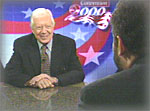 JIMMY
CARTER: Well, it's nice to be back. This is one of my favorite places,
as a matter of fact. JIMMY
CARTER: Well, it's nice to be back. This is one of my favorite places,
as a matter of fact.
RAY SUAREZ: Well, you're at the 2000 convention, depending on how you
look at it, the first convention of the new century or the last one
of the old century. Is this party one that you recognize, that has a
central core that really hasn't changed very much from when you were
active in politics?
JIMMY CARTER: There's some elements of it that are almost compatible
with when I was in the White House. I would say a total commitment to
working families' well-being; secondly, a commitment to the environment
and to the end of racial discrimination, and quite different from many
of the Democratic leaders when I was in Washington, a commitment to
very conservative economic policies, with a balanced budget, very tight
control over expenditures versus income. So I would say that the last
eight years there's been a remarkable demonstration of good economic
leadership and Al Gore has been an integral part of that so I feel very
close to him. Obviously the eight years has been marred, you know, by
the scandals that resulted in the House vote of impeachment but that's
something for which no one could hold Al Gore responsible.
RAY SUAREZ: Having said that, doesn't he have a fairly subtle task
ahead, both stepping into the spotlight himself but still wanting to
run on a record?
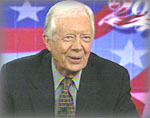 JIMMY
CARTER: Well, there are two statements that are unquestionable. One
is, he was deeply involved in the decision-making process that brought
Alan Greenspan and kept him in the Federal Reserve system and also that
brought Rubin into the Secretary of the Treasury's office, which has
resulted in a good economic system, there's no doubt about that. Secondly,
he was not involved in any way in the relationship between President
Clinton and Monica Lewinsky. So, the two factors that you questioned
me about are inherently separated and not related. But in the public's
mind you are right, he does have that problem. I think that after President
Clinton's speech and his departure the following morning, the Democratic
Party structure, the political institution that encompasses me and all
of the Democrats will be led by Al Gore and Joe Lieberman. And there's
a different demeanor, there's a different consciousness, between a person
who is always walking in the shadow of a President, which every Vice
President has to do, on the one hand, and a man who has now taken a
role of leadership for the future with his own Vice President who has
to walk in his shadow. So I think there's going to be an apparent and
very clear distinction between the past eight years and the next four
years. But, as far as economics and progress is concerned, I hope it
will be a continuous process. JIMMY
CARTER: Well, there are two statements that are unquestionable. One
is, he was deeply involved in the decision-making process that brought
Alan Greenspan and kept him in the Federal Reserve system and also that
brought Rubin into the Secretary of the Treasury's office, which has
resulted in a good economic system, there's no doubt about that. Secondly,
he was not involved in any way in the relationship between President
Clinton and Monica Lewinsky. So, the two factors that you questioned
me about are inherently separated and not related. But in the public's
mind you are right, he does have that problem. I think that after President
Clinton's speech and his departure the following morning, the Democratic
Party structure, the political institution that encompasses me and all
of the Democrats will be led by Al Gore and Joe Lieberman. And there's
a different demeanor, there's a different consciousness, between a person
who is always walking in the shadow of a President, which every Vice
President has to do, on the one hand, and a man who has now taken a
role of leadership for the future with his own Vice President who has
to walk in his shadow. So I think there's going to be an apparent and
very clear distinction between the past eight years and the next four
years. But, as far as economics and progress is concerned, I hope it
will be a continuous process.
|
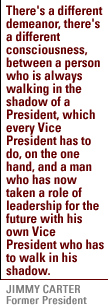 |
|
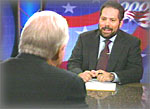 RAY
SUAREZ: Well, while you see that split very clearly, is it an argument
that's hard to make in the way we run campaigns today, 30-second commercials,
quick appearances in shopping centers and in public spaces? RAY
SUAREZ: Well, while you see that split very clearly, is it an argument
that's hard to make in the way we run campaigns today, 30-second commercials,
quick appearances in shopping centers and in public spaces?
JIMMY CARTER: Well, that's one of the advantages of a convention. And
lot of people say why spend all this money at this convention here,
with 15,000 news reporters showing up and 5,000 delegates, we already
know who's going to be the next candidate for President and Vice President,
both parties. But it's a way to have a pep rally, to clarify issues
as much as possible, and I would say for an incumbent party to pass
the mantel, from the existing President to what we hope will be the
next President. So I think that the candidacy is enhanced in almost
every case by a successful convention, which I'm sure this will be.
But that is always a challenge to make. I remember that George Bush,
the daddy, was completely in the shadow of Ronald Reagan; Nixon was
completely in the shadow of Eisenhower; Hubert Humphrey was completely
in the shadow of Lyndon Johnson; and some of them went on to greater
things, as you know, to be President. And I think the same thing will
happen in the case of Al Gore.
RAY SUAREZ: You've mentioned a couple of times Bill Clinton's task
in this process. Talk about how he accomplishes both a look back at
some things that he does want to crow about but also making that transition
and moving the party now to be the Al Gore party.
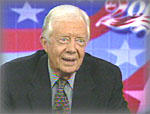 JIMMY
CARTER: Well, I'm sure that what Bill Clinton wants as much as anything
is to see his legacy approved in economic and social matters and foreign
policy by the election of Al Gore. So he won't do anything advertent
to hurt Gore's chances to separate himself from the Clinton embarrassments
and to move forward to a successful election in November. And so I think
that after he has left Los Angeles Tuesday morning, it'll be Al Gore's
convention and campaign. The second thing is that even if President
Clinton wants to cling to the semblance of authority and power and the
center stage after next January, that won't be possible. When he goes
to Washington two years from now he's not going to be met by you or
Jim Lehrer or Sam Donaldson or Cokie Roberts or anyone else; he's going
to be met by an absence of people focusing on what he happens to be
doing. The center will be focused on the President, I hope Al Gore.
So I've been through that, and President Clinton and I have had several
conversations about his own future. I've tried to assure him that the
best times of my life have been after the White House. You have served
a great nation, the greatest nation on Earth, and then you have freedom
from political obligations, you have an almost unlimited menu of things
that you can either choose or say no; you have a chance for an adventurous
and challenging and unpredictable, I would say a gratifying life. JIMMY
CARTER: Well, I'm sure that what Bill Clinton wants as much as anything
is to see his legacy approved in economic and social matters and foreign
policy by the election of Al Gore. So he won't do anything advertent
to hurt Gore's chances to separate himself from the Clinton embarrassments
and to move forward to a successful election in November. And so I think
that after he has left Los Angeles Tuesday morning, it'll be Al Gore's
convention and campaign. The second thing is that even if President
Clinton wants to cling to the semblance of authority and power and the
center stage after next January, that won't be possible. When he goes
to Washington two years from now he's not going to be met by you or
Jim Lehrer or Sam Donaldson or Cokie Roberts or anyone else; he's going
to be met by an absence of people focusing on what he happens to be
doing. The center will be focused on the President, I hope Al Gore.
So I've been through that, and President Clinton and I have had several
conversations about his own future. I've tried to assure him that the
best times of my life have been after the White House. You have served
a great nation, the greatest nation on Earth, and then you have freedom
from political obligations, you have an almost unlimited menu of things
that you can either choose or say no; you have a chance for an adventurous
and challenging and unpredictable, I would say a gratifying life.
|
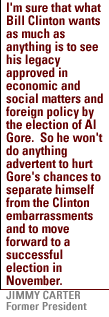 |
|
RAY SUAREZ: Well, on that last day, like you, he will be a very young
man. He'll have a lot of life ahead.
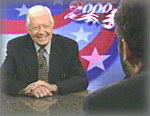 JIMMY
CARTER: Yeah, he will be. He and I have been two of the youngest people,
certainly in this century, that have survived the White House. He has,
will probably a life expectancy of at least 25 years after he leaves
the White House, so he's going to have to face the same question I did
-- what are you going to do with those 25 years? When you're treated
with respect all over the world, when you have knowledge of international
and national affairs that's very valuable to many people, you don't
want to encroach on the authority or the prerogatives of people who
are actually holding office, how do you carve out that career for yourself?
And I don't have any doubt that he will. Clinton is a brilliant man;
he's a Rhodes scholar, as you know, he's been a college professor, so
he can teach, like I do at Emory University; he could be maybe at the
University of Arkansas. And I'm sure he's going to establish a center
somewhat similar to the Carter Center -- whatever he felt was still
an ongoing opportunity or obligation to serve the public. It'll give
him a foundation from which he can act. JIMMY
CARTER: Yeah, he will be. He and I have been two of the youngest people,
certainly in this century, that have survived the White House. He has,
will probably a life expectancy of at least 25 years after he leaves
the White House, so he's going to have to face the same question I did
-- what are you going to do with those 25 years? When you're treated
with respect all over the world, when you have knowledge of international
and national affairs that's very valuable to many people, you don't
want to encroach on the authority or the prerogatives of people who
are actually holding office, how do you carve out that career for yourself?
And I don't have any doubt that he will. Clinton is a brilliant man;
he's a Rhodes scholar, as you know, he's been a college professor, so
he can teach, like I do at Emory University; he could be maybe at the
University of Arkansas. And I'm sure he's going to establish a center
somewhat similar to the Carter Center -- whatever he felt was still
an ongoing opportunity or obligation to serve the public. It'll give
him a foundation from which he can act.
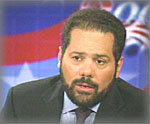 RAY
SUAREZ: You're going to be remembered tonight and paid tribute to tonight
as part of the convention program. Talk a little bit about how far that
goes towards perhaps assuaging some of the hurts of not being recognized
at previous conventions. RAY
SUAREZ: You're going to be remembered tonight and paid tribute to tonight
as part of the convention program. Talk a little bit about how far that
goes towards perhaps assuaging some of the hurts of not being recognized
at previous conventions.
JIMMY CARTER: Well, I've been to every convention, let's see, in '84,
'88, '92, I've been to every convention since I left the White House
except '96, and this time I was asked, urged, by Al Gore to come make
a major speech at the convention; I really didn't want to do that. The
Carter Center's work is now so totally non-partisan, multi-partisan,
that I didn't want to make a major talk. And then the idea was sent
to me by Al Gore, why don't you come to the convention, enjoy yourself,
join your family who are already scheduled to be there, and let us do
a video presentation about your life in the White House and so forth
to let the Democrats express their appreciation for your service. And
so that appealed to me, so that's why we came, so I'm looking forward
to a very pleasant evening without the chore and obligation of having
to make a major speech.
RAY SUAREZ: So getting a big hurrah is easy work.
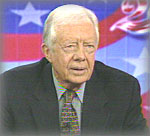 JIMMY
CARTER: That's very nice, yeah, much better, I enjoy that. JIMMY
CARTER: That's very nice, yeah, much better, I enjoy that.
RAY SUAREZ: President Jimmy Carter, thanks for joining us.
JIMMY CARTER: It's a pleasure to be with you.
|
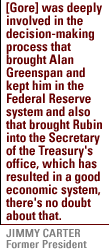
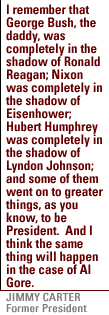
|
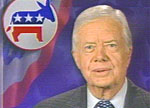


 JIMMY
CARTER: Well, it's nice to be back. This is one of my favorite places,
as a matter of fact.
JIMMY
CARTER: Well, it's nice to be back. This is one of my favorite places,
as a matter of fact.  JIMMY
CARTER: Well, there are two statements that are unquestionable. One
is, he was deeply involved in the decision-making process that brought
Alan Greenspan and kept him in the Federal Reserve system and also that
brought Rubin into the Secretary of the Treasury's office, which has
resulted in a good economic system, there's no doubt about that. Secondly,
he was not involved in any way in the relationship between President
Clinton and Monica Lewinsky. So, the two factors that you questioned
me about are inherently separated and not related. But in the public's
mind you are right, he does have that problem. I think that after President
Clinton's speech and his departure the following morning, the Democratic
Party structure, the political institution that encompasses me and all
of the Democrats will be led by Al Gore and Joe Lieberman. And there's
a different demeanor, there's a different consciousness, between a person
who is always walking in the shadow of a President, which every Vice
President has to do, on the one hand, and a man who has now taken a
role of leadership for the future with his own Vice President who has
to walk in his shadow. So I think there's going to be an apparent and
very clear distinction between the past eight years and the next four
years. But, as far as economics and progress is concerned, I hope it
will be a continuous process.
JIMMY
CARTER: Well, there are two statements that are unquestionable. One
is, he was deeply involved in the decision-making process that brought
Alan Greenspan and kept him in the Federal Reserve system and also that
brought Rubin into the Secretary of the Treasury's office, which has
resulted in a good economic system, there's no doubt about that. Secondly,
he was not involved in any way in the relationship between President
Clinton and Monica Lewinsky. So, the two factors that you questioned
me about are inherently separated and not related. But in the public's
mind you are right, he does have that problem. I think that after President
Clinton's speech and his departure the following morning, the Democratic
Party structure, the political institution that encompasses me and all
of the Democrats will be led by Al Gore and Joe Lieberman. And there's
a different demeanor, there's a different consciousness, between a person
who is always walking in the shadow of a President, which every Vice
President has to do, on the one hand, and a man who has now taken a
role of leadership for the future with his own Vice President who has
to walk in his shadow. So I think there's going to be an apparent and
very clear distinction between the past eight years and the next four
years. But, as far as economics and progress is concerned, I hope it
will be a continuous process. RAY
SUAREZ: Well, while you see that split very clearly, is it an argument
that's hard to make in the way we run campaigns today, 30-second commercials,
quick appearances in shopping centers and in public spaces?
RAY
SUAREZ: Well, while you see that split very clearly, is it an argument
that's hard to make in the way we run campaigns today, 30-second commercials,
quick appearances in shopping centers and in public spaces? JIMMY
CARTER: Well, I'm sure that what Bill Clinton wants as much as anything
is to see his legacy approved in economic and social matters and foreign
policy by the election of Al Gore. So he won't do anything advertent
to hurt Gore's chances to separate himself from the Clinton embarrassments
and to move forward to a successful election in November. And so I think
that after he has left Los Angeles Tuesday morning, it'll be Al Gore's
convention and campaign. The second thing is that even if President
Clinton wants to cling to the semblance of authority and power and the
center stage after next January, that won't be possible. When he goes
to Washington two years from now he's not going to be met by you or
Jim Lehrer or Sam Donaldson or Cokie Roberts or anyone else; he's going
to be met by an absence of people focusing on what he happens to be
doing. The center will be focused on the President, I hope Al Gore.
So I've been through that, and President Clinton and I have had several
conversations about his own future. I've tried to assure him that the
best times of my life have been after the White House. You have served
a great nation, the greatest nation on Earth, and then you have freedom
from political obligations, you have an almost unlimited menu of things
that you can either choose or say no; you have a chance for an adventurous
and challenging and unpredictable, I would say a gratifying life.
JIMMY
CARTER: Well, I'm sure that what Bill Clinton wants as much as anything
is to see his legacy approved in economic and social matters and foreign
policy by the election of Al Gore. So he won't do anything advertent
to hurt Gore's chances to separate himself from the Clinton embarrassments
and to move forward to a successful election in November. And so I think
that after he has left Los Angeles Tuesday morning, it'll be Al Gore's
convention and campaign. The second thing is that even if President
Clinton wants to cling to the semblance of authority and power and the
center stage after next January, that won't be possible. When he goes
to Washington two years from now he's not going to be met by you or
Jim Lehrer or Sam Donaldson or Cokie Roberts or anyone else; he's going
to be met by an absence of people focusing on what he happens to be
doing. The center will be focused on the President, I hope Al Gore.
So I've been through that, and President Clinton and I have had several
conversations about his own future. I've tried to assure him that the
best times of my life have been after the White House. You have served
a great nation, the greatest nation on Earth, and then you have freedom
from political obligations, you have an almost unlimited menu of things
that you can either choose or say no; you have a chance for an adventurous
and challenging and unpredictable, I would say a gratifying life.  JIMMY
CARTER: Yeah, he will be. He and I have been two of the youngest people,
certainly in this century, that have survived the White House. He has,
will probably a life expectancy of at least 25 years after he leaves
the White House, so he's going to have to face the same question I did
-- what are you going to do with those 25 years? When you're treated
with respect all over the world, when you have knowledge of international
and national affairs that's very valuable to many people, you don't
want to encroach on the authority or the prerogatives of people who
are actually holding office, how do you carve out that career for yourself?
And I don't have any doubt that he will. Clinton is a brilliant man;
he's a Rhodes scholar, as you know, he's been a college professor, so
he can teach, like I do at Emory University; he could be maybe at the
University of Arkansas. And I'm sure he's going to establish a center
somewhat similar to the Carter Center -- whatever he felt was still
an ongoing opportunity or obligation to serve the public. It'll give
him a foundation from which he can act.
JIMMY
CARTER: Yeah, he will be. He and I have been two of the youngest people,
certainly in this century, that have survived the White House. He has,
will probably a life expectancy of at least 25 years after he leaves
the White House, so he's going to have to face the same question I did
-- what are you going to do with those 25 years? When you're treated
with respect all over the world, when you have knowledge of international
and national affairs that's very valuable to many people, you don't
want to encroach on the authority or the prerogatives of people who
are actually holding office, how do you carve out that career for yourself?
And I don't have any doubt that he will. Clinton is a brilliant man;
he's a Rhodes scholar, as you know, he's been a college professor, so
he can teach, like I do at Emory University; he could be maybe at the
University of Arkansas. And I'm sure he's going to establish a center
somewhat similar to the Carter Center -- whatever he felt was still
an ongoing opportunity or obligation to serve the public. It'll give
him a foundation from which he can act.  RAY
SUAREZ: You're going to be remembered tonight and paid tribute to tonight
as part of the convention program. Talk a little bit about how far that
goes towards perhaps assuaging some of the hurts of not being recognized
at previous conventions.
RAY
SUAREZ: You're going to be remembered tonight and paid tribute to tonight
as part of the convention program. Talk a little bit about how far that
goes towards perhaps assuaging some of the hurts of not being recognized
at previous conventions. JIMMY
CARTER: That's very nice, yeah, much better, I enjoy that.
JIMMY
CARTER: That's very nice, yeah, much better, I enjoy that. 
